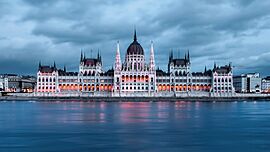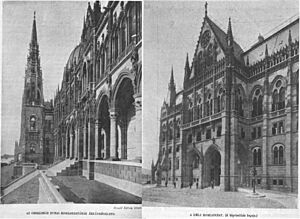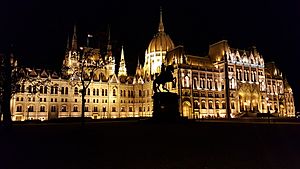Hungarian Parliament Building facts for kids
Quick facts for kids Hungarian Parliament Building |
|
|---|---|
|
Országház
|
|

The main façade as seen from the Danube
|
|
| General information | |
| Type | Parliament |
| Architectural style | Gothic Revival |
| Location | Budapest, Hungary |
| Coordinates | 47°30′25″N 19°02′44″E / 47.50694°N 19.04556°E |
| Current tenants | National Assembly of Hungary |
| Height | 96 m (315 ft) |
| Dimensions | |
| Other dimensions | Width: 123 m (404 ft) Length: 268 m (879 ft) |
| Technical details | |
| Floor count | 4 |
| Floor area | 18,000 m2 (193,800 sq ft) |
| Lifts/elevators | 13 |
| Design and construction | |
| Architect | Imre Steindl |
| Other information | |
| Number of rooms | 691 |
| UNESCO World Heritage Site | |
|---|---|
| UNESCO World Heritage Site | |
| Official name | Budapest, including the Banks of the Danube, the Buda Castle Quarter and Andrássy Avenue |
| Criteria | Cultural: ii, iv |
| Inscription | 2002 (26th Session) |
| Area | 473.3 ha |
| Buffer zone | 493.8 ha |
The Hungarian Parliament Building is a very important and famous building in Budapest, Hungary. It's also known as the Parliament of Budapest. This grand building is where the National Assembly of Hungary meets to make laws for the country. It's a popular place for tourists to visit.
You can find it on Kossuth Square, right next to the Danube River. The building was designed by a Hungarian architect named Imre Steindl. He used a style called neo-Gothic. It first opened in 1902. Since it was finished, it has been the largest building in all of Hungary. The design was inspired by other famous buildings, like the Gothic Vienna City Hall. It also has Renaissance-style parts, like its dome.
Contents
Building History: A Look Back
Budapest became one big city in 1873. Before that, it was three separate cities: Buda, Óbuda, and Pest. A few years later, the country's leaders decided they needed a new, impressive building. This building would show that Hungary was a strong and independent nation. They wanted it to face the beautiful Danube River.
A competition was held to find the best design. Imre Steindl won with his plans. His design looked a lot like the Palace of Westminster in London. Hungarian leaders at the time wanted their new parliament to show their connection to Western Europe, especially Britain. They saw Britain as a great example for their country.
Construction began in 1885. The building was partly opened in 1896, celebrating Hungary's 1,000th anniversary. It wasn't fully finished until 1904. To build it, workers used 40 million bricks, half a million precious stones, and 40 kilograms (about 88 pounds) of gold! Sadly, the architect, Imre Steindl, went blind and passed away before his amazing building was completely done.
After World War II, Hungary's government changed. Now, only one group of lawmakers meets there. The government uses only a small part of the building today. The other side is sometimes used for special events. For a while, a red star was on top of the dome. But it was removed in 1990 when communism ended in Hungary.
Amazing Features of the Parliament
The Parliament Building is built in the Gothic Revival style. It looks the same on both sides, with a big dome in the middle. This dome has a Renaissance Revival style. Inside, the building is also very symmetrical. It has two identical halls for parliament meetings. Today, one hall is used by the Hungarian National Assembly. The other is used for ceremonies, meetings, and tours.
This building is huge! It is 268 meters (about 879 feet) long and 123 meters (about 403 feet) wide. This makes it the biggest building in Hungary since it was built. Inside, there are 10 courtyards, 13 elevators, 27 gates, 29 staircases, and 691 rooms. More than 200 of these rooms are offices.
The building is 96 meters (about 315 feet) tall. This height is a special nod to the year 1896. That year marked 1,000 years since Hungary was founded in 896. For many years, it was one of the two tallest buildings in Budapest.
The main front of the building faces the Danube River. But the official main entrance is on the east side, from the square. All over the building, inside and out, there are 242 sculptures. On the outside, you can see statues of Hungarian rulers, leaders from Transylvania, and famous military heroes. The coats of arms (symbols) of kings are above the windows. Two lion statues guard the eastern staircase.
When you go inside, you walk up grand, fancy stairs. You can see beautiful paintings on the ceiling. There's even a statue of the architect, Imre Steindl. Other statues include famous figures like Árpád and Stephen I. The building also has amazing stained glass and glass mosaics made by Miksa Róth.
One of the most famous parts is the central hall. It has 16 sides! Two huge rooms are connected to it: the Lower House and the Upper House. Today, the National Assembly meets in the Lower House. The Upper House is used for conferences. Since 2000, the Holy Crown of Hungary has been displayed in the central hall. This crown is also shown on Hungary's coat of arms. Because the building is so big and detailed, it is almost always being renovated to keep it looking perfect.
Getting There and What's Nearby
The Parliament Building is easy to reach by public transport. You can take Metro Line 2 or Tram Line 2 to the Kossuth Lajos Square station.
Right in front of the building, on the east side, you'll find a memorial to the 1956 Hungarian Revolution. There's also the impressive Kossuth Memorial and a statue of Francis II Rákóczi on horseback. A statue of the poet Attila József sits on the south lawn. He is shown as described in his poem By the Danube. Next to Kossuth Square is Martyrs' Square, which has a statue of Imre Nagy.
Images for kids
-
Statue of Gyula Andrássy near the south side of the building
-
Holy Crown of Hungary in the central hall
See also
 In Spanish: Parlamento de Hungría para niños
In Spanish: Parlamento de Hungría para niños

















